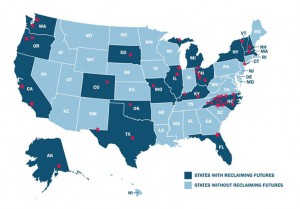Before sharing our accomplishments and expansion efforts, let’s take a moment to acknowledge numerous people and organizations that we have had the privilege of working with over the past few years to implement Reclaiming Futures’ version of Screening, Brief Intervention, and Referral to Treatment (RF-SBIRT).
Topics:
Adolescent Mental Health, Adolescent Substance Abuse Treatment, New York, North Carolina, Ohio, Oregon, SBIRT, school, strength-based, Vermont, Washington
Collaboration. A word we use a lot at Reclaiming Futures. Why? Because based on our fifteen years of working in jurisdictions across the country, collaboration can be an impactful catalyst for change. While the National Office puts collaboration into action regularly it was recently visibly demonstrated.
As you may know, Reclaiming Futures is part of the Regional Research Institute (RRI) at Portland State University. We are affiliated with such efforts as the National Wraparound Initiative, The Center to Advance Racial Equity, and Pathways Transition Training Partnership (PTTP). A few months ago, Evan Elkin, Christa Myers and I began conversations with Drs. Eileen Brennan and Pauline Jivanjee of PTTP to develop a joint webinar. Both groups understand the importance of collaboration between stakeholders in juvenile justice settings to improve the health and wellness of young people with substance use and/or mental health concerns. However, our focus for the webinar did not become immediately clear. We spent time examining our commonalities to decide the best topic for diverse fields and individuals (e.g., juvenile justice; behavioral health; community members). We decided to emphasize our respective work in the area of evidence-based practices.
As many of you know, Reclaiming Futures was awarded a Conrad N. Hilton Foundation grant in September 2014. The purpose of this grant is to develop, pilot test, evaluate, and disseminate a new version of SBIRT for youth at risk for deeper involvement with the juvenile justice system. As a first step, Reclaiming Futures issued a request for proposals and awarded five sites to help us in the endeavor. The sites selected, through a competitive process, were:
-
Chittenden County, Vermont
-
King County, Washington
-
Mecklenburg County, North Carolina
-
Nassau County, New York
-
Washington County, Oregon
Reasons why I am proud to write this blog post...
Reason 1: My former colleagues (and friends) at The University of Arizona, Southwest Institute for Research on Women (UA SIROW) (UA SIROW) have been leading the efforts on the national evaluation of Juvenile Drug Courts and Juvenile Drug Courts blended with Reclaiming Futures (JDC/RF). UA SIROW collaborated with Chestnut Health Systems and Carnevale Associates, LLC to implement a comprehensive evaluation that included data from Juvenile Drug Courts, Juvenile Drugs Courts blended with Reclaiming Futures, and non-justice related intensive adolescent outpatient programs. The purpose was to examine processes, outcomes, and costs.
Topics:
Adolescent Mental Health, Adolescent Substance Abuse Treatment, Assessment, Community Engagement, Disproportionate Minority Contact, NDCI, OJJDP, Public Policy, Reclaiming Futures, research, strength-based, treatment court
 Scholarships for Judges Managing Challenging Family Law
Scholarships for Judges Managing Challenging Family Law
This training is co-sponsored by the National Council of Juvenile and Family Court Judges and the National Judicial College, October 24-27, 2011, in Reno, Nevada. The scholarships would cover the $985 tuition fee and the participant would be responsible for the $245 conference fee as well as their own travel expenses.- National Geographic Examines the Teenage Brain
Excitement, Novelty and Risk: A strength-based look at adolescence as a highly functional, even adaptive period.
- OJJDP Bulletin Examines State Juvenile Transfer Laws
In the 1980s and 1990s, legislatures in nearly every state expanded transfer laws that allowed or required the prosecution of juveniles in adult criminal courts. This bulletin, which is part of the Juvenile Offenders and Victims National Report Series, provides the latest overview of state transfer laws and practices and examines available state-level data on juveniles adjudicated in the criminal justice system.





